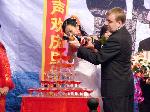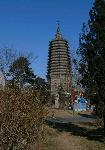- Getting around Lijiang. Dont stay in the Old Towns more than 2 days, there is nothing to do. KRISS Oct 9, 2013 05:46
- 2013 Beijing Temple Fair BENNYLAU Feb 26, 2013 03:29
- Malaysian traveling from KUL - LAX vis Shanghai PVG ZATI_DY Jan 3, 2013 20:15
A Wedding in Jinzhou
- Views: 3903
- |Vote: 0 0
- |Add to Favorites
- |Recommend to Friends
Love in Liaoning
The true heart of China is somewhere most travellers never choose to venture. Shuttled between major economic centres and the most famous of China's historical treasures, the hundreds and thousands of small towns we pass by almost never see a tourist's face, and yet it's those small towns where the drama of contemporary China is played out, day after day, and where a visitor can most readily experience genuine Chinese culture.
Liaoning province itself is often sadly missing from the itineraries of China's visitors, and yet the little city centres scattered around its plains and farmlands are home to rich customs and traditions - for which China's Northeast is well-known within China itself. Liaoning has always attracted me for the open and uncynical, rough character of its people. Foreign friends I've made who have chosen to live in Liaoning have often expressed that they feel the same way.
I met Shane shortly after he arrived in Liaoning from Britain, and we became workmates in Dalian city right after he fell in love with the place and decided to stay for as long as possible. No stranger to China, Shane had studied Mandarin for several years back home and was already fluent in the language. He was a gentleman in China, and a sincere and unselfish teacher. It was no surprise to me, therefore, when he fell in love again, this time with a beautiful Chinese girl from the small Liaoning town of Jinzhou studying in Dalian. Vivian was as fluent in English as Shane was in Chinese, and they were a perfect match.
I was delighted to be invited to their marriage this year in Vivian's hometown. Not only was it a chance to see two good friends take their vows, it was an opportunity to participate in a Chinese tradition foreigners rarely see - a Chinese-style wedding - and to visit a beautiful town with its own grand history - Jinzhou.
Jinzhou in modern times is little-known, but this wasn't always the case. It's had strategic importance in times of war for its location - if Dongbei is the head of China, then Jinzhou is at its throat - and so in ancient times passage into the more well-developed areas of the North from Beijing inevitably passed through here. It was a thriving walled city in Ming Dynasty times - although little of the city wall remains these days - and was also the focus of the relatively recent Liaoshen Campaign in the Chinese civil war, where Communist and Nationalist forces clashed on Jinzhou's doorstep for control of the recently reclaimed Manchurian region, won back from the Japanese after a lengthy occupation at the end of the Second World War. Prosperity in the new Millennium has seen Jinzhou become a spacious and attractive township of three million people in an increasingly comfortable corner of the country.
The Ceremony
Chinese people generally do not marry in a church or a temple, but in a restaurant. Many Westerners find this tradition inappropriate, but in China, a marriage isn't a religious affair that requires a priest to deliver the sanction of God (which, in the increasingly secularized West, may seem in itself inappropriate) but a social occasion where family and community is to be celebrated in an atmosphere of joy and jubilation - and where better to do that than over a wedding banquet?
Vivian's parents had prepared a fantastic gathering to mark the wedding of their daughter, and Shane had been instructed in the appropriate etiquette and traditional gestures they would be expected to follow in order to get married in a truly Chinese fashion. When I saw him before the wedding, he was probably as nervous as all bridegrooms are all over the world on their wedding day, but seemed outwardly relaxed and confident, well-rehearsed as if for a performance, which in a way is what a wedding is supposed to be.
The day started early in the family home, which was already crowded with guests and relatives. Vivian sat in her room in glorious makeup with her bridesmaid and a small entourage of girls as Shane knocked on the door and humbly asked to be let in. As Vivian sat quietly, the girls pestered him loudly – “Who are you? What do you want? Who is she to you? Why do you want to see her?” – until they let him inside at last to present flowers on his knees to his bride with applause from all.
At that, we were signalled that it was time to move on to the restaurant - or in this case, a hall especially hired to house the 500 guests who would be attending this wedding. A long string of firecrackers were let off to scare away any evil spirits, and then Shane carried Vivian over the threshold of her family home out into the world where he would be expected to provide for her. In this instance, he carried her all the way over to a waiting limousine - in a wedding in which no expense had been spared.
More firecrackers were lighted at the wedding hall, where the bride and groom were handed a white dove which they let free into the sky. Once inside, the guests were seated and waited for the exact time pre-calculated to be the most auspicious - 9.18am - at which moment the bride and groom, accompanied by the bridesmaid and best man, paraded past the guests to the familiar 'Here Comes the Bride' - a tradition borrowed from the West.
They stood on stage, where a presenter who spoke and acted like a television host introduced them and invited a few representatives - myself amongst them - to say a few words. Shane himself took the microphone and expressed thanks to the guests and to his new in-laws, and then the guests were served their food as the bride and groom descended from the stage.
If you're used to a Western wedding, you'd have been waiting for the moment when the priest says, 'I now pronounce you man and wife', after which moment the couple would be accepted as being married. In a Chinese wedding, there's not that one moment. Instead, the bride and groom walk around every table to present themselves as a couple to each guest individually. The bride, who has to quickly change from white to red clothes, will light a cigarette for each guest, and the groom will drink a shot of spirits. It goes without saying that 500 glasses of Chinese baijiu could kill a man before he has a chance to father any grandchildren: generally, because this is merely a traditional gesture, it's not necessary to actually drink. Sometimes water is exchanged for the spirits and in Shane's case, he was instructed not to open his lips when lifting the glass. No-one seemed to mind at all.
There was much feasting, drinking, and merriment. Then, without warning, the bride and groom finished their rounds, and almost everyone left, except for the small table of foreigners at the front who weren't sure what was happening. Shane came over and sat down with us after a few moments, with a satisfied smile. One of his British friends asked, is that it?
Yep, he said. I'm married.
Seeing Jinzhou
The wedding had been spectacular, and whilst the other guests nursed their hangovers, I made my way out to purchase a map and see a few of the sites around Jinzhou.
Jinzhou had impressed me from the beginning: amongst those more humble of Liaoning’s towns, Jinzhou seemed fresh and spacious. It may have been the crisp, cold winter air, or the fact that during Spring Festival many Chinese prefer to stay indoors with family, leaving the streets uncrowded and open. I preferred to think that Jinzhou is a city of ideal size and population in a fertile and prospering area of Liaoning.
With more time, a visitor to Jinzhou could visit several historical sites in the outer city, the most beautiful of which is the Guanyin Cave, just ten minute’s drive away from town, where an attractive statue of the female Goddess of Mercy sits tall in her own grotto. Given the limitations on my sightseeing time (another indulgent dinner of celebration was scheduled for that evening) I chose to limit myself to looking around the city – and was not disappointed with the attractions Jinzhou has to offer.
Closest to the centre of town is the War Memorial Museum and park, which is host to a remarkably complete collection of exhibits from the civil war. Jinzhou was the centre of the Liaoshen Campaign, and at the Battle of Jinzhou, which took place on October the 13th-15th, 1948, the Communists took the upper hand in a victory that changed the course of the entire war. The museum is 50 yuan to enter, but if you just feel like wandering through the park, you’ll be able to enjoy an assortment of cannon and warplanes placed around the grounds, and marvel at the towering statue of the Unknown Soldier of the campaign.
Jinzhou’s signature attraction is the Guangji Tower, located in the southeast corner of town opposite a police station that looks about at huge as Beijing’s West Train Station. The 72 metre tower is a beautiful example of Liao Dynasty architecture dating from the year 1057. With thirteen levels in an octagonal shape, the tower was recently lovingly restored and resembles a tower of concentric lotuses. A quiet temple beneath, as well as an accompanying museum, complete the ancient Chinese setting.
I was fortunate that a taxi driver directed me across the road from the tower park – there, hidden in a corner beneath what is probably Jinzhou’s most fashionable and expensive housing district, lies the Youguo Temple. Not marked on the map, this sweet temple is home to Jinzhou’s oldest structure – a tower of only a few metres high that I was told is around 1,500 years old. A kind monk had opened the main hall and gestured at where I could prostrate myself in front of the Buddha – he was so delighted when I did so that he excused himself to the monk’s hall to ask permission to give me an apple that had been dedicated to the Buddha. It’s said to be very good luck to eat consecrated fruit, and it was delicious – as I sat in the taxi headed back for the hotel, I figured I’d need the luck to stay sober during another boisterous celebration of my good friends’ marriage. Fortunately, having enjoyed my stay in Jinzhou, I was entirely in the mood for the festivities.






 Copyright © 1998-2026 All rights reserved.
Copyright © 1998-2026 All rights reserved.